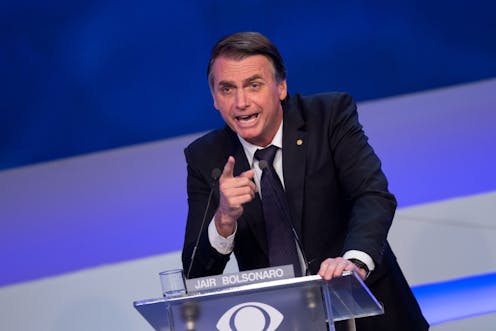
Brazilians will face one of the most important elections of their lives on October 2 2022, after four years of growing polarisation and political violence under President Jair Bolsonaro.
Although the upcoming elections are centred on the presidential run, Brazilians will also vote for governors and members of the federal and state legislative houses. For all of these roles, there is a political divide.
There are candidates aligned with Bolsonaro, those supporting the major opposition candidate former president Luiz Inácio Lula da Silva (known as Lula), and those proposing a third way. Many suggest these are the most polarised and violent election campaigns in the country’s contemporary history.
At the time of the writing, Lula is poised to win the election, with some reputable polls expecting him to win in the first round of the elections. However, Bolsonaro – and most of his supporters – believe that the current president is set to be re-elected.
Emulating former US president Donald Trump, Bolsonaro has said many times that he might not respect the election results and that the electoral justice system is not to be trusted.
If Lula wins, he will face a series of obstacles in order to restore respect for Brazil’s national institutions and the democratic rule of law. It is likely that before he takes office, Brazilian institutions will already have to deal with Bolsonaro whipping up scepticism over the results if they don’t go his way.
This might range from protests against “electoral fraud” to more violent actions (similar to those on the US Capitol by Trump supporters).
Trump-style tactics
Even if he loses, it is likely that Bolsonaro will survive as a political figure. Around 10% to 20% of the population remain staunch supporters.
Bolsonaristas are likely to continue to hold office at all levels. His elder sons are a senator and a city councilman. His middle son is set for re-election as a federal congressman. Most elections for governors in the Amazonian states, for instance, are expected to be won by his supporters. In other states the results are harder to predict.
It is likely that familiar tactics including threats, attacks and fake news will be used against an incoming president from another party. Increasing gun ownership, the increase of violence, and the decline of public debate are also systemic troubles across the nation.
Some people argue that polarisation and political violence rose in the years before the election of Bolsonaro in 2018. During his government, however, both grew further, fostered by the president’s angry rhetoric.
Threats and fake news shared by the president are often echoed by his followers, creating fear and animosity against the opposition. The election campaign has also been marked by violence.
How a country divided
Episodes of political violence have multiplied in the last few months, ranging from threats to physical violence and murders. These acts are usually carried out by Bolsonaro’s followers against supporters of the opposition.
Individuals are targeted for criticising the government, showing support for the opposition, or even diligently performing their duties. Indigenous people, activists, politicians, journalists, and many other citizens have been victims of attacks.
Experts in academia and beyond argue that Brazil is facing a process of democratic or constitutional erosion. Recently, the country has been categorised as part of the third wave of “democratisation reflux” – that is part of an authoritarian backlash against democracy.
Read more: Brazil: how populist politicians use religion to help them win
A series of factors explain these movements under way in the country. The process of creating a democratic justice system that began when the country became a democracy in 1988 was incomplete, leaving some authoritarian remnants in Brazilian institutions. Neoliberal policies, electoral attacks, the spread of fake news and major internal crises accentuated the problem.
However, there is a broad consensus that Bolsonaro’s rise to power was responsible for the democratic erosion faced by the country. Most recently, the president’s repeated attacks on democratic institutions – especially the judiciary, the electoral system, the media and the opposition – have broadened the divide and amplified political violence.
All of these threats will have to be addressed after the election in order for Brazil’s democracy to get back on track. Recent movements to support a broad coalition for democracy indicate that it is possible to unite those with different political views. But first, we must wait for the result.
Felipe Tirado receives funding from the Centre for Doctoral Studies - King's College London (https://www.kcl.ac.uk/study/doctoral-studies).
This article was originally published on The Conversation. Read the original article.







